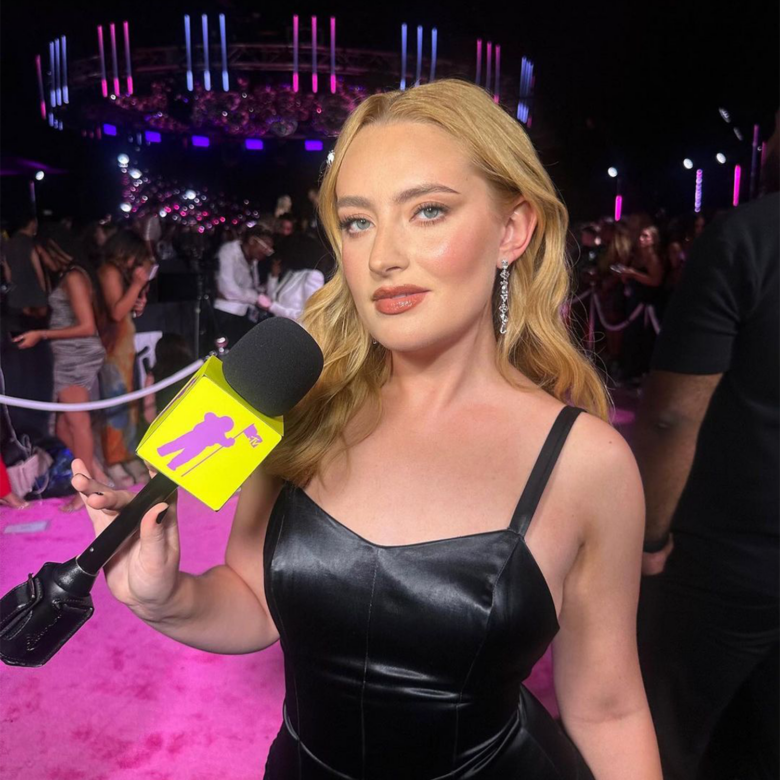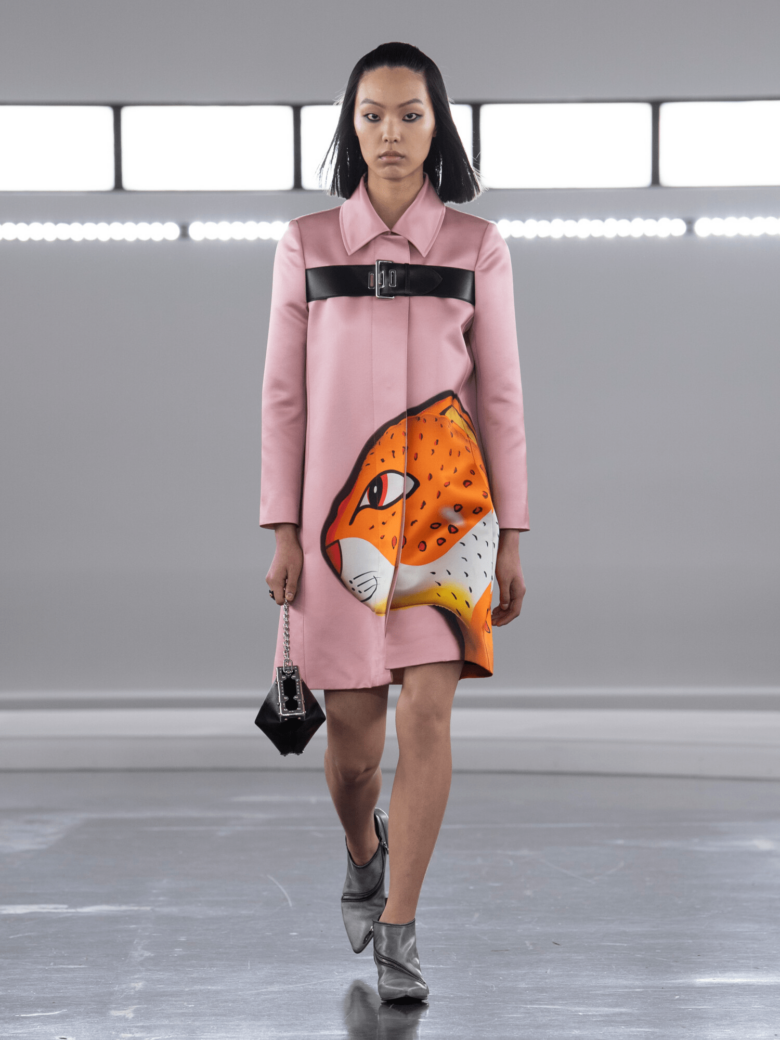‘I Am Suing My Parents For Emotional Abuse – An Affidavit’: The book exploring loss, healing, and heartbreak
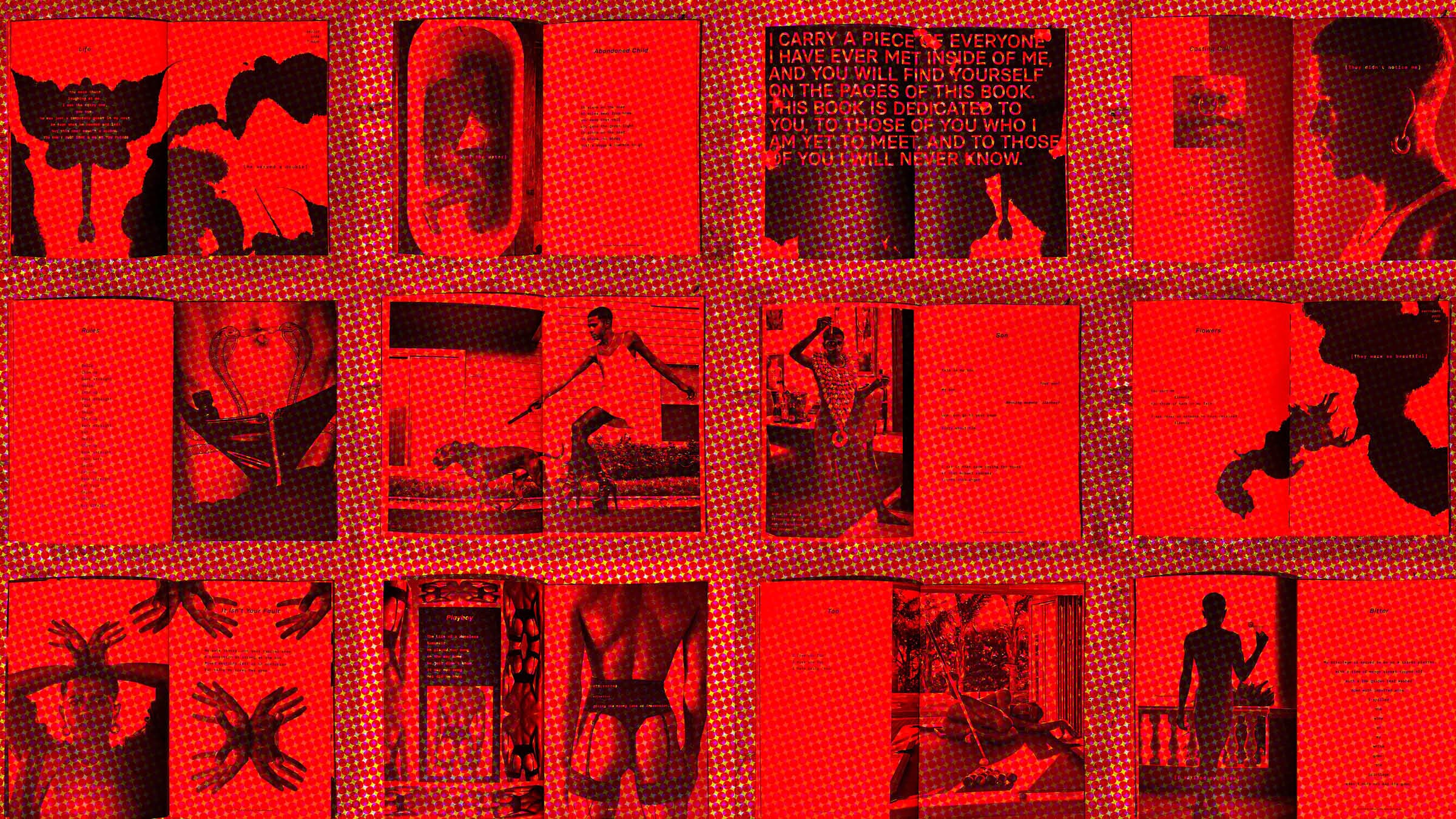
It took poet, model, and performer Kaiden Ford over a decade to write their book, I Am Suing My Parents For Emotional Abuse – An Affidavit. One week post-launch, the creative tunes in for a call with HUNGER, and the journey into the making of Kaiden Ford quickly becomes a topic of conversation.
Born in New York to conservative Dominican parents, Ford says that their childhood and birth name is a completely separate person to who they are now. There is no obvious assumption to make about Ford, and writing wasn’t even their first port of call, since growing up with dyslexia and ADHD made sharing their story a barrier: “I was never a writer. I don’t know what I’m doing, and I’m not here to sell for mass production. I’m trying to share this story in as many ways as I can, and I think that’s what makes me different.” By breaking down this wall and cultivating a tight group of truly caring relationships, Ford’s journey to removing themselves from their parents is detailed, laying bare that cutting someone off is not a cruel task, but instead, a necessity in order to grow.
From hiding in their brother’s closet to journal at the age of 15, to moving to London to pursue dance as a Black non-binary queer person, the now 25-year-old opens up on how letting go of negativity is no small feat. The relationship with their parents came to a head when Ford opened up to their mum following suicidal attempts, which weren’t acknowledged or supported. Putting their foot down once and for all, they moved out of their childhood home and in with their sister in Pennsylvania, embracing a life of moving from place to place. As Ford says, “Stability has always been a huge goal for me, but life has a different plan. For now, I’m enjoying the memories I’m making and the people I’m meeting.”
Since moving on from living with hurt and victimhood, Ford is in a place where their story is now inspiring others to explore self-love and actualisation. With this self-love comes a sense of free-spiritedness, and as a creative, their life cannot be boxed into one job. “A lot of people label me as an artist,” shares Ford. “But I just feel like I’m a queer person existing, and through my existence, I stumble upon these opportunities and chances to share my story.”
It’s Ford’s mission to make literature as accessible as possible so others like them can read in solidarity, with the hope that when they finish they can begin to conquer their own pain. The life of Ford is detailed through candidly gritty prose, addressed to their parents directly, and sculpted by photographs and artwork. Exposing raw insight into the inner workings of the creative’s mind, artwork by Art Director and Photographer Martin Perry sits alongside the verses. Ink blots signify the psyche of Ford, and glamorous images taken from international travel show the contrast between their life now and the struggle it took getting there.
Here, they share the turbulent story of their parent’s emotional abuse, how they overcame it, and why this is only the first step to becoming the true Kaiden Ford…
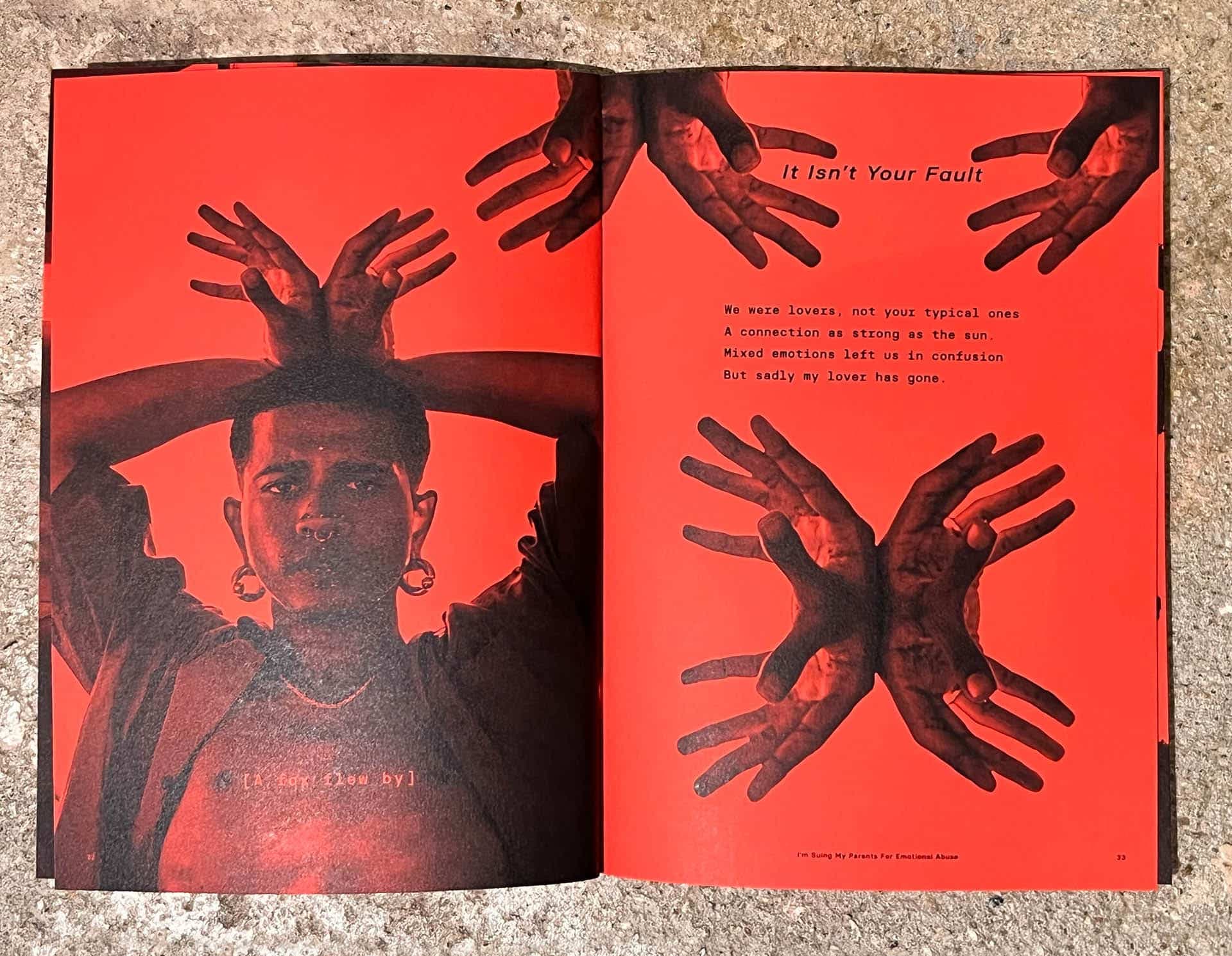
Hey, Kaiden! Where did the idea to write your book, ‘I Am Suing My Parents For Emotional Abuse – An Affidavit’, come from?
I was 17 years old looking through all my childhood journals. I realised that there was a lot of pain there that I hadn’t come to fully accept until I shared these poems with my friends and they said this stuff is really fucked up. By putting it all together in a book, acknowledging it, and putting it out for people there in the world, then I had no choice. I couldn’t hide from it. With the book launch that I had last week, I have come to terms with why I’ve been working on it for so many years now. I’m only at the beginning of this healing stage, which I thought the second I finished the book and it was physically in my hand that it would be the end of it, and it’s not.
What parts of your life do you draw upon for inspiration?
All of it. Every month of my life, ever since I was the age of 14, it’s always been a new city, new location, new goals or aspirations, and new failures. It just constantly never ends. When I was very depressed and suicidal at a young age, I realised that the story at the end is a lot more interesting. I kept seeing my life change and I was really intrigued to see how the story was going to go. Now I just live with that philosophy. Where is it going to go next? I keep getting surprised by where I’m heading, but I’m enjoying the journey and ready for it.
When did you start writing? Did you begin with poetry or did other outlets come first?
I actually grew up in special education. I was diagnosed with a learning disability in second grade. I hated reading and I hated writing because it was very triggering. Every time I had a test in school, I was always separated from the class and put into private teacher help with one-on-one reading for me. They understood that I was able to comprehend things and I was just struggling with writing. It was when I found my journals with my best friend Kai, who understood what I was trying to say, that he became my ghostwriter. I don’t speak like other people but I came to the realisation that just because I’m dyslexic and I have ADHD it doesn’t mean I don’t have a voice and I shouldn’t share it. In doing this, I can show other people like me that even though we struggle, our voice still matters and we should still speak up. In the book, you can see that a lot of the poems are very simple because I didn’t want literature to be something complex for people who weren’t blessed with a good education. Just because I’m not very eloquent, doesn’t mean I don’t have a voice.
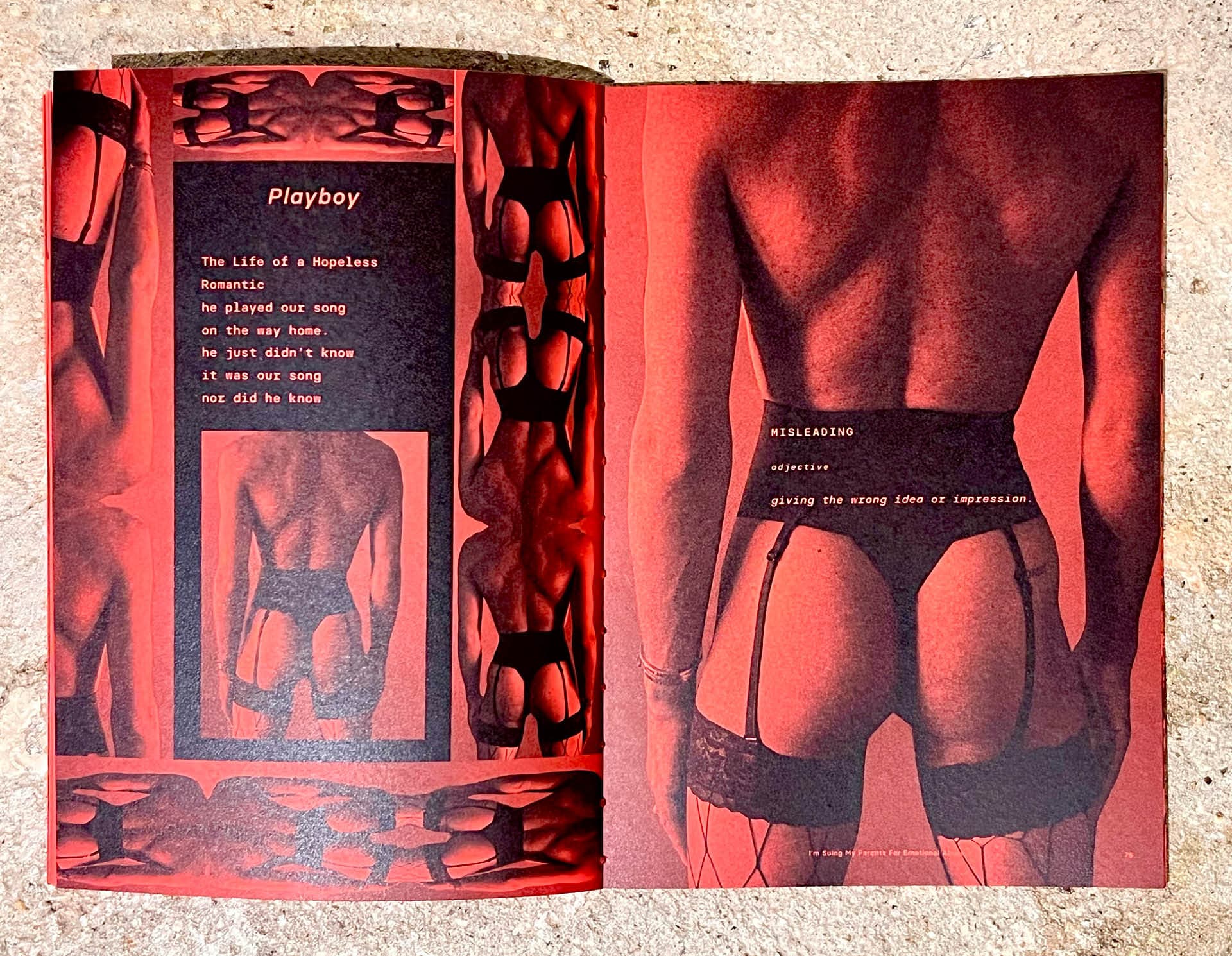
Why did poetry become the vessel for what you wanted to say?
It was the only way I knew how to say something without it turning into an essay. Being someone who has ADHD, I just lose interest in big books with chapters. Saying something very powerful in only a sentence or two helps me connect with the reader and makes sure my message is getting across.
Were there any musicians you were listening to while writing the book?
Sigur Rós was a big inspiration for me. They sing in a language called Hopelandic, which is Icelandic mixed with gibberish. I didn’t understand what they were saying, but I could feel the pain in the voices and in the tune, and that was something I wanted to put across in my own work. I really wanted to create a soundtrack for this book to embody the emotion. I worked a lot on the design, so when you’re feeling the book and touching it, that’s one aspect of it. Another aspect is writing and then digital imagery of photos and ink blots. The ink blocks are there to help people understand my psyche.
Which poem in your book means the most to you and why?
The poem ‘Heroin’. My sister suffered from heroin addiction. I came to the realisation that there’s a good chance that she will be joining the 27 club. She was very wise and I did get a lot of inspiration from her. Now I’m 25, I can see how drug addiction and drug abuse really surrounded a lot of my life. It was scary, and it still resonates with me now so I think the poem is very powerful.
How do you feel your book differs from the self of books already out there?
I was never a writer. I don’t know what I’m doing, and I’m not here to sell for mass production. I’m trying to share this story in as many ways as I can, and I think that’s what makes me different. A lot of people who are writers try to turn this into a multi-million-dollar business but I am just sharing my pain. I don’t want this to be my end goal in life. I have too much potential… Life is too short to just do one thing.
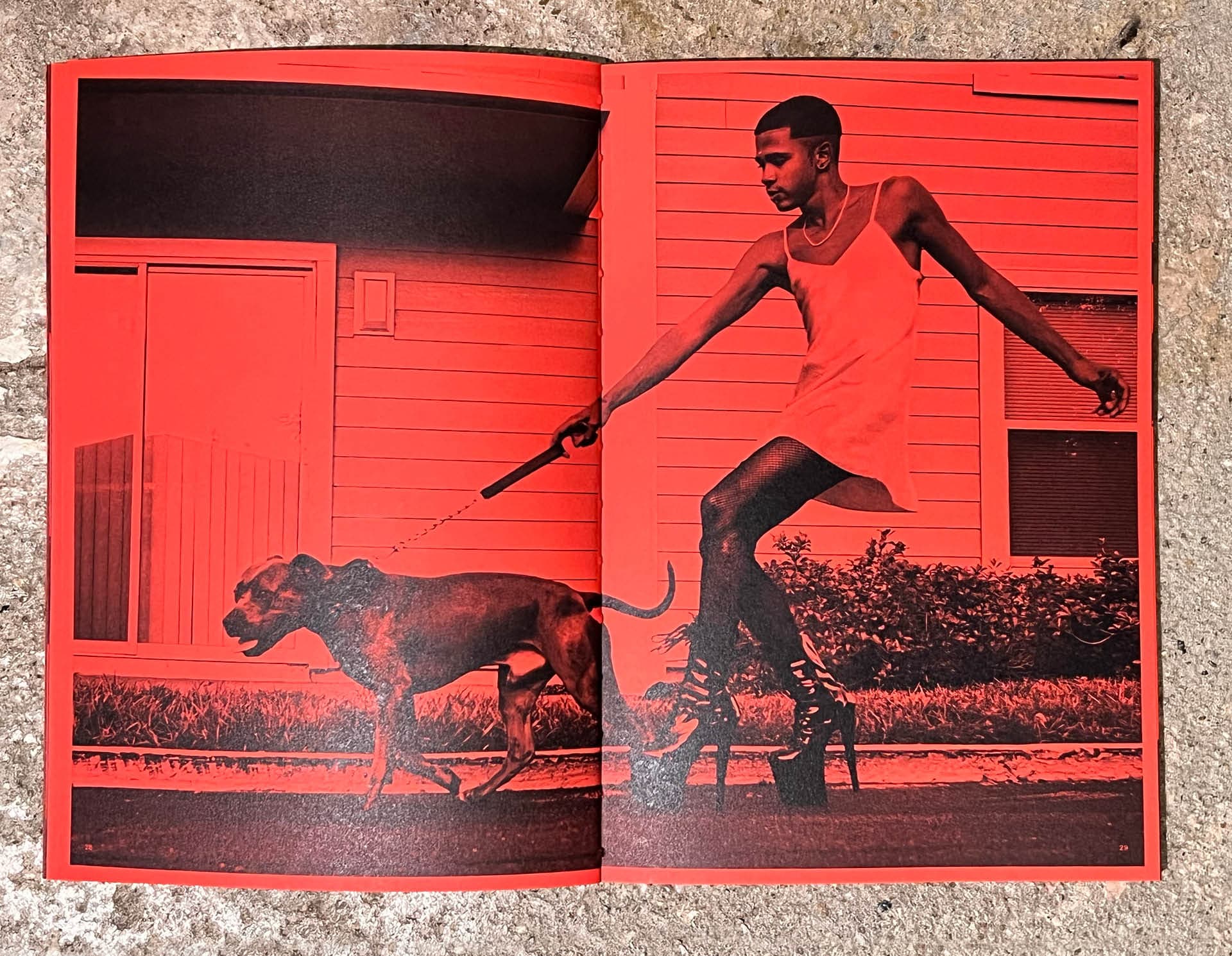
How did you transition from living with this hurt to a place of self-love?
It was survival. I literally had no choice. It was death or transformation into this new creature. Kaiden Ford is not my given name, but it was born after I let go of my past and I killed that boy. I couldn’t keep taking him on and there was too much pain there. In 2016, I wrote in my journal “This is the birth of Kaiden Ford and he has an amazing future.” It came from putting my foot down and saying, ‘I am not living this life anymore’, and I took back control. I confronted my mum one day about my suicidal attempts and she just didn’t acknowledge it. The next day I moved out of her house and into my sister’s house in Pennsylvania. That was my life from then on out, living in places temporarily. It’s been eight years now and I still live by that mindset.
What has been the reception of your book, especially from those close to you?
The reaction from some of my friends who didn’t care was very shocking to me. I realised that just because someone’s in your life it doesn’t mean they’re there to fully support you. That was a whole wake-up call in itself because of the emotional side of this book. But then I got a lot of reactions from strangers and people I didn’t know telling me how powerful and inspiring it was for them. Going from me almost taking my life to realising how strong my words and actions are to other people – it is unbelievable.
What’s your go-to self-love activity?
I prioritise mindfulness. So, pole dancing, yoga, and being with my dogs. I spend four hours a day just walking around the city with my dogs. I have a very small circle because I am a freelancer and I don’t have a nine-to-five, so being able to rely on my dogs stabilises me. They’ve taught me that I am a mother and I do love caring for people. Being able to give them that energy really grounds me because if I didn’t have something to nurture, it would send me spiralling. But also gardening as well – I love plants!
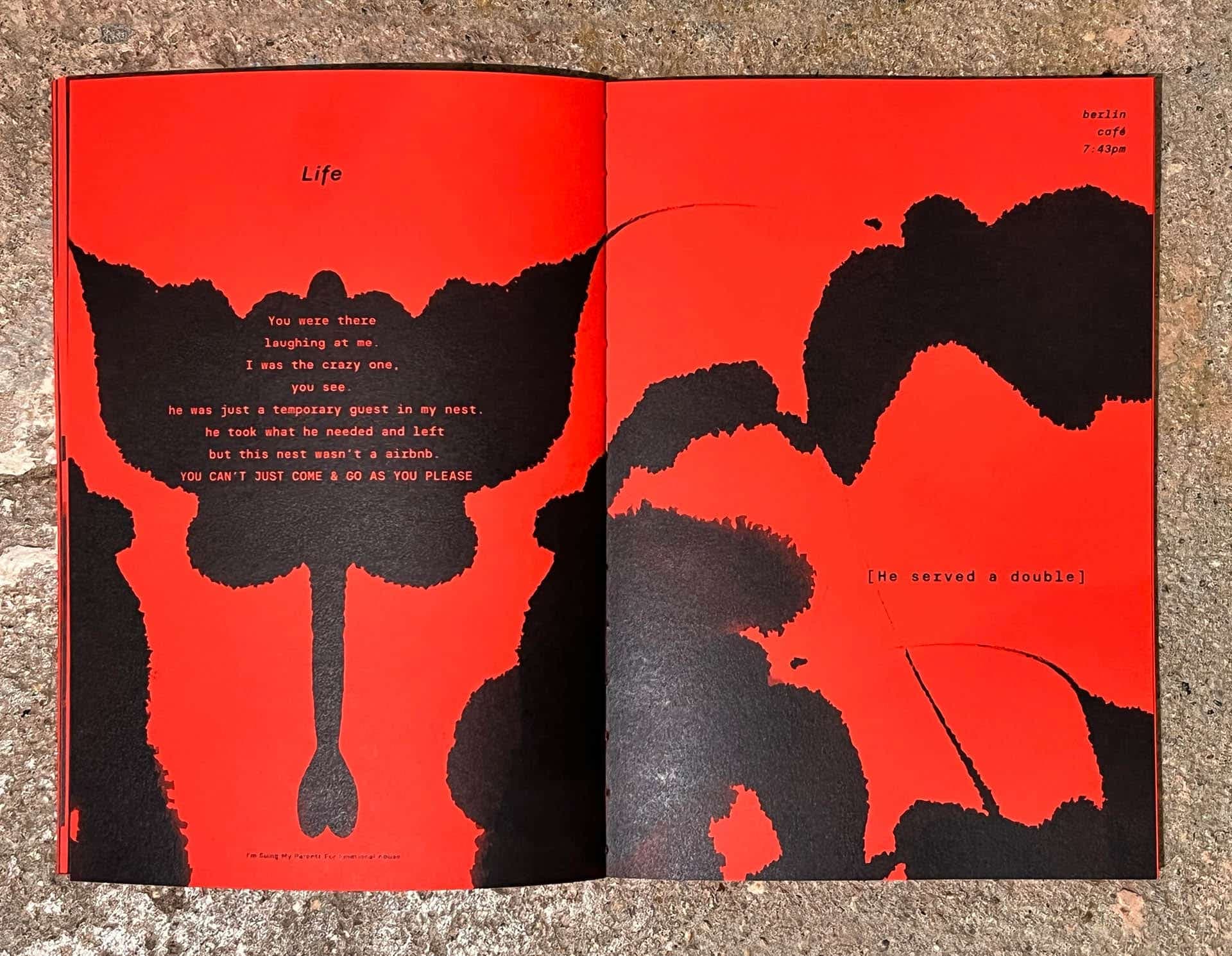
Who has been your favourite performer to work with?
I perform with Sue Veneers, Little Gay Brother, and Jodie Harsh. I do a lot of festivals and I’ve performed for Peggy Gou. But Chester Hayes, the owner of Sue Veneers, is not only a boss but has treated me like a family member by welcoming me with open hands. That’s just something you don’t get very often.
What do you recommend others to do to start this journey of healing?
Understand where the pain is coming from, why you feel the way you feel, and write letters to the people who brought you pain even if you don’t send them. Be able to go back and read that letter another time, maybe when you’re not so angry. It is looking at a person from another side, which is what I did with my mum. I did understand a lot of her stuff was emotional trauma from her parents, but I can only forgive her so much if she didn’t want to change who she was. I don’t wish anything bad on her, I would just rather not be part of that. I would suggest that people take the risk. I was living with my sister in a stable home and I got an opportunity to work in Thailand for a month, and she said, ‘If you go to Thailand, you can’t move back into this house’. I told her, thank you for that opportunity, but I’m going to Thailand. I wouldn’t have blossomed into who I am today if not, and I chose not to take the easy route because I knew I wasn’t happy.
What is next for Kaiden Ford?
I will be performing at Milkshake Festival and Mighty Hoopla Festival. My book is now going on tour and I will be hitting some major cities like Manchester, Amsterdam, and Barcelona.
That sounds amazing. Good luck with everything!
